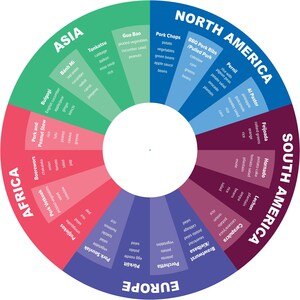Teen Breakfast Skippers Who Eat More Protein At Breakfast Eat Fewer Calories Later In The Day
New Research Suggests High-Protein Breakfast with Lean Pork Leads to Voluntary Reduction in Mid- to Late-Day Snacks Full of Unwanted Fat and Sugar Calories
DES MOINES, Iowa, April 22, 2013 /PRNewswire/ -- Teenage boys and girls who chronically skip breakfast have a new and tasty weapon in the fight against obesity. A new, 12-week study presented this week at Experimental Biology from researchers at the University of Missouri suggests that eating a protein-rich breakfast – one that includes lean ham or pork sausage – reduces daily hunger, increases daily fullness, improves morning blood sugar control, and, perhaps most importantly, leads to less, latter-day snacking thus reducing calories from fat and sugar.[1]
"Nutritionists always tout the importance of breakfast, but now we understand just how powerful choosing to eat lean protein, like pork sausage or ham, at breakfast can be for teen breakfast skippers in particular," said study lead Dr. Heather Leidy, Assistant Professor in the Department of Nutrition & Exercise Physiology at the University of Missouri. "Based on this research, taking the time each morning to eat a healthy breakfast – one consisting of about 40 percent of calories from carbohydrates and 40 percent of calories from protein – leads to reduced snacking later in the day thanks to the satiating effects of protein early in the day."
As many as 20 to 30 percent of adolescents in the United States do not eat breakfast at all and are dubbed "breakfast skippers,"[2] a habit associated with excess body weight, according to the 2010 Dietary Guidelines for Americans.[3] The teens who were assigned to eat a high protein breakfast experienced a decreased intake of approximately 400 calories later in the day. However, those who continued to skip breakfast as well as those who ate the same number of calories for breakfast but had much less protein did not reduce daily intake. This 400 calorie decrease in the high protein breakfast group was due to voluntarily eating fewer high-fat/high-sugar snacks in the late afternoon and evening; that is, the teens just chose to eat less on their own without any external restrictions or guidance to do so.
Both breakfast groups, totaling 54 teenage boys and girls, consumed 350 calorie meals. However, the lower protein group consumed high carbohydrate ready-to-eat cereals whereas the high protein group consumed meals containing foods such as pork and egg burritos, lean ham with protein-rich pancakes and raspberry syrup, or protein-rich blueberry waffles with syrup and a pork sausage patty. Both had the same amount of fat (about 20% of total calories) in their breakfasts.
These new findings in teen breakfast skippers is consistent with past research in adult men that demonstrated the benefits of including lean pork in three daily meals, not just at breakfast, as a way to reduce late-night desires to eat, increase feelings of fullness, and decrease distracting thoughts about food.[4], [5] This new study also is consistent with a similar study conducted by the same University of Missouri researchers suggesting a breakfast high in protein significantly improves appetite control and reduces unhealthy, evening snacking for overweight or obese adolescent females.[6]
"Increasing evidence suggests that incorporating lean pork into the diet can help with appetite control and body weight management, while also providing key nutrients that growing teens and adults alike need in their daily diet," added Dr. Leidy.
More than just a good source of protein, lean pork also provides several vitamins and minerals including thiamin, phosphorus, zinc, selenium, niacin, vitamin B6, and vitamin B12.[7] Plus, today's most popular cuts have 16 percent less total fat and 27 percent less saturated fat than they did 20 years ago. Cuts of pork that come from the loin – including chops and roasts – and 96 percent lean ground pork are the leanest cuts of pork available.
About The National Pork Board
The National Pork Board has responsibility for Checkoff-funded research, promotion and consumer information projects and for communicating with pork producers and the public. Through a legislative national Pork Checkoff, pork producers invest $0.40 for each $100 value of hogs sold. The Pork Checkoff funds national and state programs in advertising, consumer information, retail and foodservice marketing, export market promotion, production improvement, technology, swine health, pork safety and environmental management.
[1] Leidy H, Hoertel H, Douglas S, Shafer R. Daily addition of a protein-rich breakfast for long-term improvements in energy intake regulation and body weight management in overweight & obese 'Breakfast Skipping' young people. Experimental Biology; April 2013.
[2] The American Academy of Pediatrics, HealthyChildren.org. The Case for Eating Breakfast. Accessed December 28, 2012 from http://www.healthychildren.org/English/healthy-living/nutrition/pages/The-Case-for-Eating-Breakfast.aspx
[3] U.S. Department of Agriculture, U.S. Department of Health and Human Services. The Dietary Guidelines for Americans, 2010, pg. 19. http://www.cnpp.usda.gov/Publications/DietaryGuidelines/2010/PolicyDoc/PolicyDoc.pdf
[4] Leidy H, Tang M, Armstrong C, Martin C, Campbell W. The effects of consuming frequent, higher protein meals on appetite and satiety during weight loss in overweight/obese men. Obesity. 2011; 19:818-824.
[5] Leidy H, Bossingham, M, Mattes R, Campbell W. Increased dietary protein consumed at breakfast leads to an initial and sustained feeling of fullness during energy restriction compared to other meal times. British Journal of Nutrition. 2009; 101(6):798-803.
[6] 1.H. J. Leidy, L. C. Ortinau, S. M. Douglas, H. A. Hoertel. Beneficial effects of a higher-protein breakfast on the appetitive, hormonal, and neural signals controlling energy intake regulation in overweight/obese, 'breakfast-skipping,' late-adolescent girls. American Journal of Clinical Nutrition, 2013; 97 (4): 677 DOI: 10.3945/ajcn.112.053116.
[7] Murphy M, Spungen J, Bi X, Barraj L. Fresh and fresh lean pork are substantial sources of key nutrients when these products are consumed by adults in the United States. Nutrition Research. 2011; 31(10):776-83.
SOURCE National Pork Board
WANT YOUR COMPANY'S NEWS FEATURED ON PRNEWSWIRE.COM?
Newsrooms &
Influencers
Digital Media
Outlets
Journalists
Opted In




Share this article